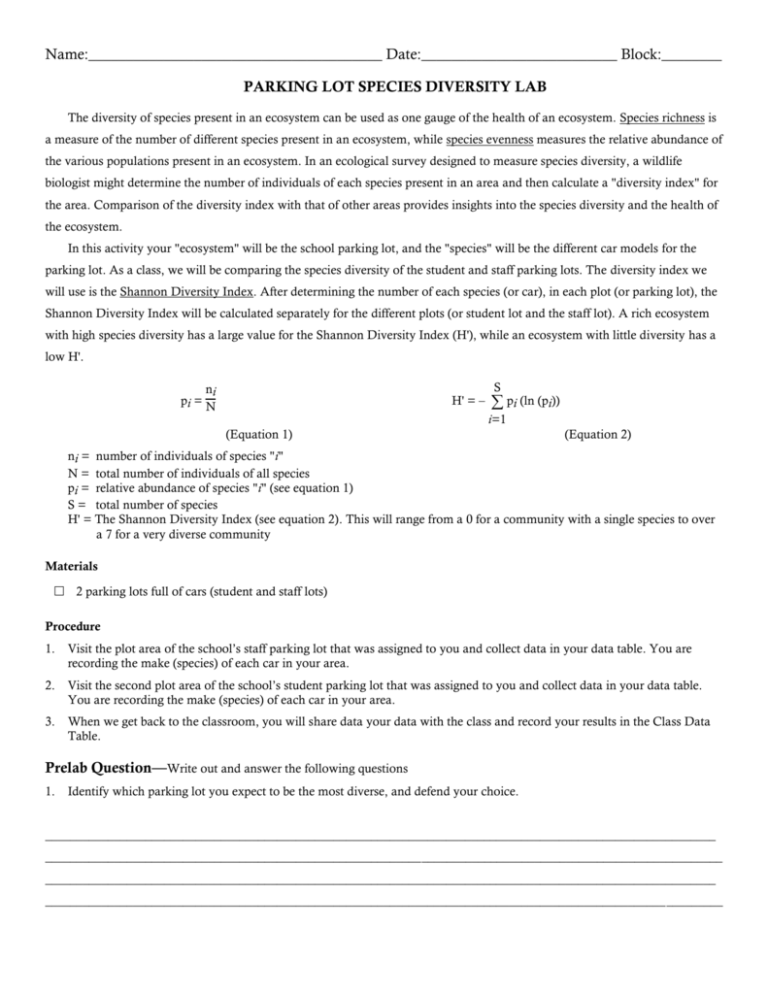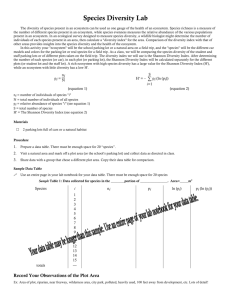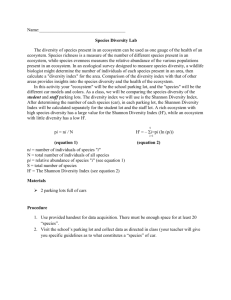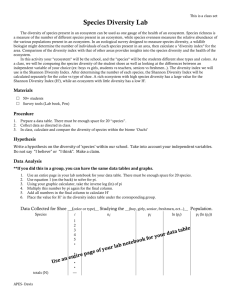Species Diversity
advertisement

Name:_______________________________________ Date:__________________________ Block:________ PARKING LOT SPECIES DIVERSITY LAB The diversity of species present in an ecosystem can be used as one gauge of the health of an ecosystem. Species richness is a measure of the number of different species present in an ecosystem, while species evenness measures the relative abundance of the various populations present in an ecosystem. In an ecological survey designed to measure species diversity, a wildlife biologist might determine the number of individuals of each species present in an area and then calculate a "diversity index" for the area. Comparison of the diversity index with that of other areas provides insights into the species diversity and the health of the ecosystem. In this activity your "ecosystem" will be the school parking lot, and the "species" will be the different car models for the parking lot. As a class, we will be comparing the species diversity of the student and staff parking lots. The diversity index we will use is the Shannon Diversity Index. After determining the number of each species (or car), in each plot (or parking lot), the Shannon Diversity Index will be calculated separately for the different plots (or student lot and the staff lot). A rich ecosystem with high species diversity has a large value for the Shannon Diversity Index (H'), while an ecosystem with little diversity has a low H'. ni pi = N H' = – S pi (ln (pi)) i=1 (Equation 1) (Equation 2) ni = number of individuals of species "i" N = total number of individuals of all species pi = relative abundance of species "i" (see equation 1) S = total number of species H' = The Shannon Diversity Index (see equation 2). This will range from a 0 for a community with a single species to over a 7 for a very diverse community Materials 2 parking lots full of cars (student and staff lots) Procedure 1. Visit the plot area of the school’s staff parking lot that was assigned to you and collect data in your data table. You are recording the make (species) of each car in your area. 2. Visit the second plot area of the school’s student parking lot that was assigned to you and collect data in your data table. You are recording the make (species) of each car in your area. 3. When we get back to the classroom, you will share data your data with the class and record your results in the Class Data Table. Prelab Question—Write out and answer the following questions 1. Identify which parking lot you expect to be the most diverse, and defend your choice. ___________________________________________________________________________________________________________ ____________________________________________________________________________________________________________ ___________________________________________________________________________________________________________ ____________________________________________________________________________________________________________ Group Data Table for Parking Lots: Staff Lot: Species Number of Individuals Record Your Observations of the Plot Area Student Lot: Species Number of Individuals Record Your Observations of the Plot Area Class Data Table for Staff Parking Lot: Species i 1 2 3 4 5 6 7 8 9 10 11 12 13 14 15 16 17 18 19 20 21 22 23 24 25 Totals — ni pi ln (pi) pi (ln (pi)) Data Table for Student Parking Lot: Species i Totals 1 2 3 4 5 6 7 8 9 10 11 12 13 14 15 16 17 18 19 20 21 22 23 24 25 — ni pi ln (pi) pi (ln (pi)) Data Analysis 1. Determine the value for the Shannon Diversity Index for the student and staff parking lots. Show all of your work below. Post Lab Questions—Write out and answer the following questions 1. Identify the parking lot that was the most diverse. Based on your observations during the lab, explain why your prediction in question #1 of the prelab was supported or not supported. ___________________________________________________________________________________________________________ ____________________________________________________________________________________________________________ ____________________________________________________________________________________________________________ ____________________________________________________________________________________________________________ 2. List the single most abundant species in each set of data, and write a plausible explanation to explain why these are the most abundant species. ___________________________________________________________________________________________________________ ____________________________________________________________________________________________________________ ___________________________________________________________________________________________________________ ____________________________________________________________________________________________________________ 3. If you conducted this lab in an airport parking lot, predict whether the Shannon Diversity Index would be high or low, and how it would compare to your plot areas. ___________________________________________________________________________________________________________ ____________________________________________________________________________________________________________ ____________________________________________________________________________________________________________ ____________________________________________________________________________________________________________ 4. If you conducted this lab on a Honda car dealership car lot, predict whether the Shannon Diversity Index would be high or low, and how it would compare to your plot area. ___________________________________________________________________________________________________________ ____________________________________________________________________________________________________________ ____________________________________________________________________________________________________________ ____________________________________________________________________________________________________________ 5. Compare and contrast species richness to biodiversity (Shannon Diversity Index). ____________________________________________________________________________________________________________ ____________________________________________________________________________________________________________ ____________________________________________________________________________________________________________ ____________________________________________________________________________________________________________ ____________________________________________________________________________________________________________






